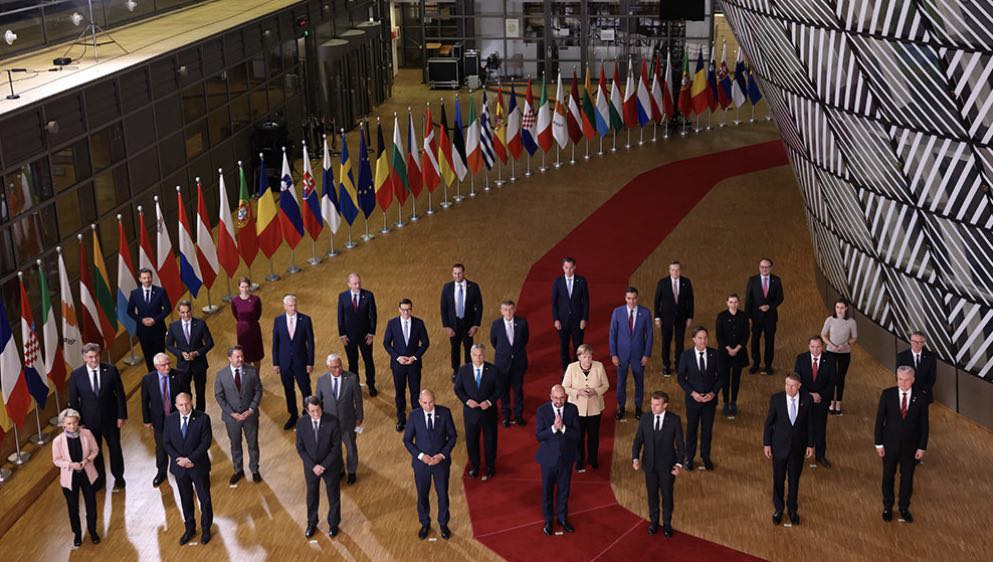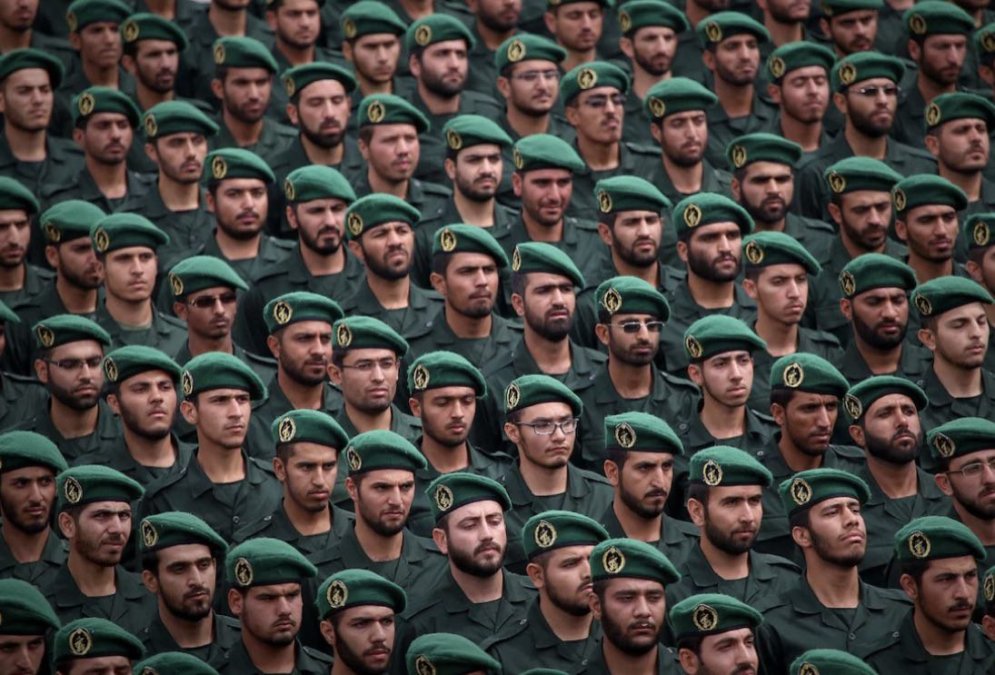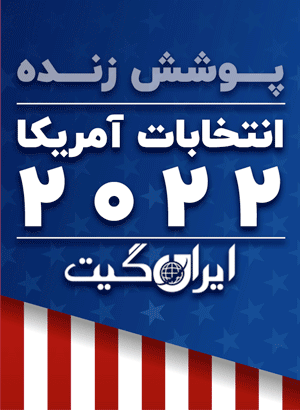The Revolutionary Guards in the position of ISIS or the army
Iranians are expected to gather once again on February 20th, the first day of Esfand, in front of the office of the Council of Ministers of the European Union to ask this council to include the Revolutionary Guards in the list of terrorist organizations, just like the European Parliament.
Following the near-unanimous vote of the European Parliament on January 19th to recognize the Revolutionary Guards as terrorists, few could have guessed that this strong vote of the European Parliament would not be approved by the Council of Ministers. Only four days later, when the issue of recognizing the Revolutionary Guards as terrorists reached the Council of Ministers, Josep Borrell, the EU’s foreign policy chief, stated that the inclusion of the Revolutionary Guards in the list of terrorist groups of the EU is subject to a decision by one of the EU courts.
Why didn’t Josep Borrell go to the European Parliament? Does this indicate a rift within the Union? Is it only Josep Borrell who is concerned about this issue, or do other countries also have considerations?
Votes in favor of European Parliament representatives
It should not be forgotten that the European Parliament’s classification of the IRGC as a terrorist organization is one of three similar votes by other European parliaments. The first parliament to declare the IRGC as a terrorist organization was the Netherlands on December 22, 2022, and it called on the Dutch government to defend this position.
The second matter came to the British House of Commons, which on January 12, 2023, approved a motion to include the IRGC in the list of terrorist organizations, with the support of the government. The third vote was by the European Parliament, which also had the favorable opinion of Ursula von der Leyen, the President of the European Commission. She stated that listing the IRGC as a terrorist organization supports the violation of basic human rights in Iran.
However, the European Union is concerned about the closure of diplomatic channels.
So far, three legislative bodies, the Netherlands, Britain, and the European Parliament, have classified the IRGC as a terrorist organization, but the similar vote has not yet been approved by the governments of the Netherlands and Britain, as well as the Council of Ministers of the European Union.
In other words, it was not only Josep Borrell who refrained from making a similar decision on behalf of the Council of Ministers of the European Union, but the governments of the Netherlands and Britain have also shown a similar reluctance in expressing their opinions with their own legislative bodies.
With this explanation, Borrell’s statements should not be simply interpreted as his personal provocative or disruptive position. This is the will of all European executive bodies to refrain from such a decision at this time. However, why should the response be seen in two aspects: legal considerations and political messages.
The Islamic Revolutionary Guard Corps
According to the Constitution of the Islamic Republic of Iran, the Islamic Revolutionary Guard Corps (IRGC) is considered one of the armed forces of the system, similar to the regular army. According to Dr. Saeed Mahmoudi, a legal expert, this characteristic distinguishes the IRGC from terrorist organizations such as ISIS and Al-Qaeda. Those who have doubts in the European Union see this characteristic as prominent and believe that the IRGC is an instrument of political sovereignty of a political system.
Therefore, if an armed group is labeled as a terrorist organization, the political system of that country will also be considered as a terrorist entity. In other words, if the Islamic Revolutionary Guard Corps (IRGC), which is under the command of the Supreme Leader, is recognized as a terrorist organization, the command of that entity, including Ali Khamenei, will also be recognized as the commander of a terrorist organization.
In other words, the principle of legal equality of governments in political immunity has provided a legal basis for some countries and possibly Joseph Borrell to refrain from recognizing the IRGC as a terrorist organization for now.
It should not be forgotten that so far, at least three countries, the United States, Saudi Arabia, and Bahrain, have listed the IRGC as a supporter of terrorism. In addition, the parliaments of the Netherlands, Britain, and Europe have also overlooked this legal observation. Therefore, it is not unlikely that the Council of Ministers of the European Union will change its opinion as well.
Despite this, an important point has been overlooked in these perspectives, which is that this very legal protection of Joseph Borrell and some European countries inherently carries a subtle yet strong political message to Tehran.
A sword of threat in response to a threat.
The reality is that up until now, a great catastrophe has befallen the Islamic Republic. The divide between Europe and America during the Trump era has intensified, and the war in Ukraine has severely poisoned the atmosphere against Tehran. Looking at the statements of parliamentarians in the Netherlands, Britain, and Europe, it is evident that there is deep-rooted hatred against the Islamic Republic, specifically the Revolutionary Guards.
With this in mind, Joseph Borrell is also aware of this feeling of hatred and disgust. However, it is strongly believed that Joseph Borrell and the governments of the Netherlands and Britain, unlike their parliaments, did not want diplomatic ties with Tehran to be blocked. A proverb says that war begins when diplomacy ends.
Doubts and fears

It seems that the Netherlands, Britain, and the European Union still want to give diplomacy a chance so that the two sides do not end up in confrontation. Labeling the Revolutionary Guards, a subsidiary of the Islamic Republic, as a terrorist organization puts it in the same category as Al-Qaeda and ISIS. With such a transformation, each member becomes a legitimate target for elimination, just like the fate of Qasem Soleimani.
The leader of the Islamic Republic and the commander-in-chief of the armed forces is practically considered the commander of a terrorist organization. Therefore, he will also be a legitimate target. In addition to these countries, they will also seek to cut off the financial resources of this terrorist organization. Due to the prominent role of the Revolutionary Guards in contrast to the army in the fields of cinema, sports, cultural development, espionage, counter-espionage, and cutting off the financial resources of the Guards, it is essentially a blow to a significant part of the Islamic Republic’s structure.
Therefore, it appears that the legislative bodies of the Netherlands, Britain, and Europe have clearly and explicitly conveyed a message to the Islamic Republic that if the Guards take a step back from their previous path, calling them terrorists will only require a short meeting of the governments of the Netherlands and Britain and the Council of Foreign Ministers of the Union. This means that the parliaments of the Netherlands, Britain, and Europe have essentially sheathed their weapon against the Islamic Republic. However, the governments of the Netherlands, Britain, and the Council of Foreign Ministers of the Union have not yet fired a shot.
And with such a decision, it is unlikely that Canada, Australia, New Zealand, Japan, South Korea, and other Western allies will remain indifferent. They will likely join the ranks of countries that consider the Guards a terrorist organization.
Based on this description, it seems that the delay in designating the IRGC as a terrorist organization is to prevent diplomatic channels from being blocked, so that they can refrain the IRGC and the Islamic Republic from hostile behavior towards the protesting people internally and from showing solidarity with Moscow in the Ukraine war. This means that from now on, the ball is in the court of the Islamic Republic to decide whether or not it wants to reconsider its policies. If not, implementing the laws passed by the parliaments of the Netherlands, Britain, and Europe only requires a short meeting.


